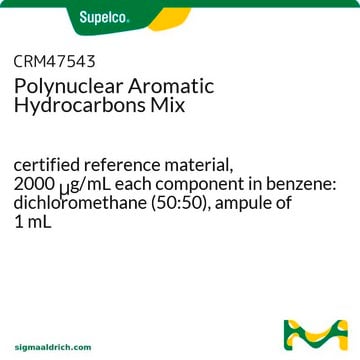30730
Atto 550 maleimide
BioReagent, suitable for fluorescence, ≥90.0% (degree of coupling)
Sign Into View Organizational & Contract Pricing
All Photos(1)
About This Item
UNSPSC Code:
12352111
NACRES:
NA.32
Recommended Products
product line
BioReagent
Assay
≥90.0% (HPLC)
≥90.0% (degree of coupling)
form
powder
manufacturer/tradename
ATTO-TEC GmbH
λ
in ethanol (with 0,1% trifluoroacetic acid)
UV absorption
λ: 552-558 nm Amax
suitability
suitable for fluorescence
storage temp.
−20°C
Application
Atto fluorescent labels are designed for high sensitivity applications, including single molecule detection. Atto labels have rigid structures that do not show any cis-trans-isomerization. Thus these labels display exceptional intensity with minimal spectral shift on conjugation. Atto 550 maleimide is suitable for fluorescence labeling of thiol/SH containing molecules.
Legal Information
This product is for Research use only. In case of intended commercialization, please contact the IP-holder (ATTO-TEC GmbH, Germany) for licensing.
Storage Class Code
11 - Combustible Solids
WGK
WGK 3
Flash Point(F)
Not applicable
Flash Point(C)
Not applicable
Personal Protective Equipment
dust mask type N95 (US), Eyeshields, Gloves
Certificates of Analysis (COA)
Search for Certificates of Analysis (COA) by entering the products Lot/Batch Number. Lot and Batch Numbers can be found on a product’s label following the words ‘Lot’ or ‘Batch’.
Already Own This Product?
Find documentation for the products that you have recently purchased in the Document Library.
Smart-aggregation imaging for single molecule localization with SPAD cameras.
Gyongy, I.; et al.
arXiv (2016)
Frauke Beilstein et al.
Cell reports, 32(7), 108042-108042 (2020-08-20)
VSV fusion machinery, like that of many other enveloped viruses, is triggered at low pH in endosomes after virion endocytosis. It was suggested that some histidines could play the role of pH-sensitive switches. By mutating histidine residues H22, H60, H132
Rahul Roy et al.
Nature methods, 5(6), 507-516 (2008-05-31)
Single-molecule fluorescence resonance energy transfer (smFRET) is one of the most general and adaptable single-molecule techniques. Despite the explosive growth in the application of smFRET to answer biological questions in the last decade, the technique has been practiced mostly by
Rula Masoud et al.
ACS nano, 6(7), 6272-6283 (2012-06-06)
We present a test case example of a detailed single-molecule fluorescence study of one of the most sophisticated and complex DNA devices introduced to date, a recently published autonomous bipedal DNA motor. We used the diffusion-based single-molecule Förster resonance energy
Robert H Meltzer et al.
Lab on a chip, 11(5), 863-873 (2011-01-21)
Rapid, specific, and sensitive detection of airborne bacteria, viruses, and toxins is critical for biodefense, yet the diverse nature of the threats poses a challenge for integrated surveillance, as each class of pathogens typically requires different detection strategies. Here, we
Our team of scientists has experience in all areas of research including Life Science, Material Science, Chemical Synthesis, Chromatography, Analytical and many others.
Contact Technical Service






